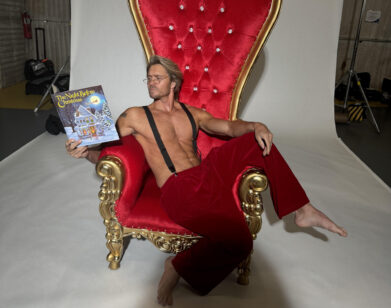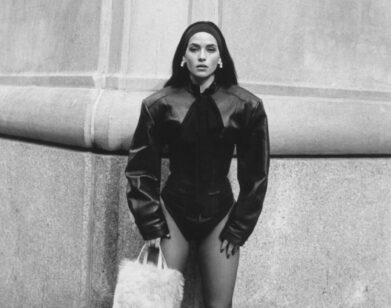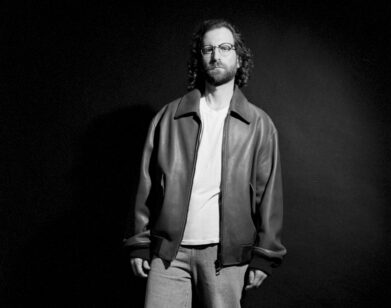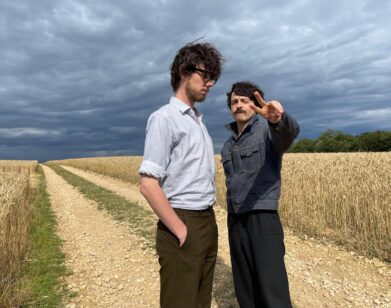Stanley Tucci’s Two-Man Show
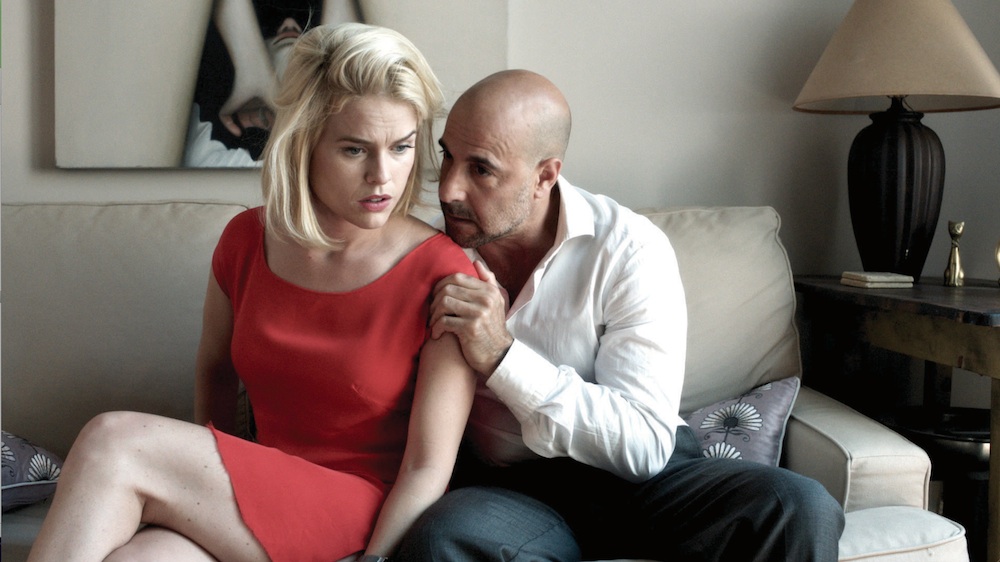
ABOVE: ALICE EVE AND STANLEY TUCCI IN SOME VELVET MORNING. PHOTO COURTESY OF ROGIER STOFFERS.
Stanley Tucci’s new film, Some Velvet Morning, features the most surprising ending of any film this year—one of its many pleasures is the all-too-rare moviegoing experience of utter unpredictability. For that gift, viewers can thank the cunning and masterful Neil LaBute.
Working from his original screenplay, LaBute directed Some Velvet Morning in an astonishing eight days. Set entirely in one house, Some Velvet Morning could have easily translated to the stage. The film consists of two characters, Fred (a cagey Tucci) and the luminous but troubled Velvet (Alice Eve). Fred has left his wife of many decades and showed up unannounced, suitcase in hand, on the doorstep of his former mistress. Although Velvet is clearly over the affair (and sleeping with Fred’s son), Fred becomes increasingly insistent that they reunite.
The pair circle each other like dangerous felines, by turns wary and vulnerable, affectionate and hostile. Tucci mines the depths of lover’s emotions: possessive, jealous, disdainful, tender, lustful, domineering, and obsessed. Tucci and Eve embody gender roles, then flip the script and trade off the control and passivity. LaBute’s dialogue is so specific, so precise, you could swear that you heard this couple hurling barbs and revisiting grudges on your subway ride this morning.
Probing the gamut of human foibles is second nature to Tucci, who slipped into his Oscar-nominated role as The Lovely Bones killer as seamlessly as he partnered with Meryl Streep on the frothy The Devil Wears Prada and Julie and Julia. We spoke with Tucci recently about LaBute, gender wars, and being a master of disguise.
LORRAINE CWELICH: To call this film’s conclusion a surprise ending is the understatement of the year.
STANLEY TUCCI: Yes, most people are very surprised and I’m glad. They really, really like it. It was quite a chance that Neil took in writing it.
CWELICH: Without revealing too much, why did Neil choose this story’s particular structure?
TUCCI: Because it’s more complicated and darker.
CWELICH: What statement is Neil making about the issues of control, domination, and possessiveness between men and women?
TUCCI: That all the different pieces of relationships that we see in them exist in all of us, and in all our relationships, in one form or another.
CWELICH: At various times in his career, Neil’s been labeled a misogynist and a misanthrope. We kind of see both those aspects here. Your character at times belittles her, but he has issues himself.
TUCCI: There are misogynistic qualities to him, but you get the sense that he might be the same way with a man—not on a sexual level, but an emotional level. It’s a question of, you always hurt the one you love.
CWELICH: Exactly; Neil is finding fault with both genders.
TUCCI: Without question. You could easily flip the roles.
CWELICH: What appealed to you about playing this character?
TUCCI: I liked the darkness of it, the humor, the ambiguity. I liked that it was so intimate and we were going to shoot it in a very short period of time. I love doing that. And of course that it was Neil, whom I’d never worked with before, and that we could do it in New York.
CWELICH: How did you personally relate to your character?
TUCCI: The complexity of human relationships we’ve all experienced, whether they’re healthy or unhealthy. Sometimes we all make relationships more complicated than they necessarily have to be.
CWELICH: Did Neil tinker with the dialogue as he shot or did you improv?
TUCCI: No improv, but we started cutting and shaping stuff from the get-go, when we did a two-day table read. We probably cut 10 pages at the table read alone. Then as we were rehearsing in the space for a short period of time and we blocked everything out, we’d shoot a scene and then he’d say, “Maybe we don’t need these two pages.” Or, “Maybe this piece of dialogue would be better served in the previous scene.” Or, “Let’s take this monologue and just use these lines in it.” So it was always changing and a work in progress.
CWELICH: You’ve previously said you were hesitant to take on a dark role such as The Lovely Bones. In this film, you relish the darker aspects.
TUCCI: Compared to this, The Lovely Bones was truly horrifying. That was the hardest thing ever. This was kind of playful in a way. Both parties are playing. In The Lovely Bones, it was much more cut and dried who was good and who was bad. The goal with that film was to make him as real as possible and embody that evil. That’s what made it challenging and interesting. You want to shy away from it because it is so disturbing, but it was a beautifully written script that felt like that story had to be told. With this piece, as you work with it, you realize it’s necessary because it shows the complexity of relationship in an often funny way.
CWELICH: Tell me about working with Alice.
TUCCI: Alice was great, incredibly bright and accomplished. You have to trust each other when you do something like this. She said the only thing that frightened her was the page count every day! The sheer amount of lines—I had done pieces like this before, so I was comfortable with the format. Once she realized it was okay if she couldn’t remember every single line verbatim, she was great.
CWELICH: What’s it like shifting gears from dramatic roles like this film to lighter fare, like The Devil Wears Prada or fantasy like Hunger Games?
TUCCI: It’s great, that’s exactly why you want to be an actor, to do all of that. To be able to play a role like this, in a film like this, then go do Hunger Games, manic, lunatic, flamboyant propaganda. It’s exciting.
CWELICH: So many actors get typecast early on as the romantic leading man or the comedian or the action-adventure guy. You’ve managed to elude that and achieve a very versatile career.
TUCCI: I’m glad; thanks for saying that. Early in my career, people wanted to pigeonhole me as the bad guy because I’m of Italian-American descent, which they often were when I started out. You have to fight against it. One of the things that helps is the ability to do comedy.
CWELICH: America’s Sweethearts was on TV the other day and you’re the studio executive. You must have had a blast skewering the Hollywood suits.
TUCCI: That was such a fun movie to do and that script was one of the funniest things I’ve ever read —Billy Crystal. Eventually somebody gives you a chance to do something off the beaten track and then suddenly people see, “Oh, he can do this or that.” I think ultimately people still don’t quite know what to do with me. [laughs] But I think that’s never going to change.
CWELICH: Upcoming?
TUCCI: I just finished doing Transformers 4 a couple of weeks ago. That was really fun. And I hope to direct a play next year in London and maybe direct a film and do some television work here in London.
SOME VELVET MORNING OPENS TODAY, DECEMBER 13.

